1852 Democratic National Convention
The 1852 Democratic National Convention was a presidential nominating convention that met from June 1 to June 5 in Baltimore, Maryland. It was held to nominate the Democratic Party's candidates for president and vice president in the 1852 election. The convention selected former Senator Franklin Pierce of New Hampshire for president and Senator William R. King of Alabama for vice president.
| 1852 presidential election | |
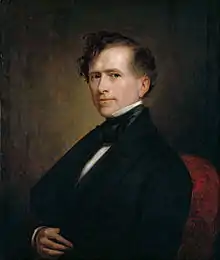 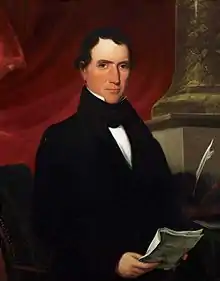 Nominees Pierce and King | |
| Convention | |
|---|---|
| Date(s) | June 1–5, 1852 |
| City | Baltimore, Maryland |
| Venue | Maryland Institute for the Promotion of the Mechanic Arts [above Centre ("Marsh") Market] |
| Candidates | |
| Presidential nominee | Franklin Pierce of New Hampshire |
| Vice presidential nominee | William R. King of Alabama |
Four major candidates vied for the presidential nomination- Lewis Cass of Michigan, the nominee in 1848, who had the backing of northerners in support of the Compromise of 1850; James Buchanan of Pennsylvania, popular in the South as well as in his home state; Stephen A. Douglas of Illinois, candidate of the expansionists and the railroad interests; and William L. Marcy of New York, whose strength was centered in his home state. Cass led on the first nineteen ballots of the convention, but was unable to win the necessary two-thirds majority. Buchanan pulled ahead on the twentieth ballot, but he too was unable to win a two-thirds majority. Pierce won votes for the first time on the 35th ballot, and was nominated almost unanimously on the 49th ballot.
King was nominated on the second vice presidential ballot, defeating Senator Solomon W. Downs and several other candidates. The Democratic ticket went on to win the 1852 election, defeating the Whig ticket of Winfield Scott and William Alexander Graham.
Location
The Maryland Institute for the Promotion of the Mechanic Arts, then an academic institution founded 1825-1826 with a variety of curriculums including mechanical arts along with visual art and design, was located on the second floor of their recently constructed 1851 landmark structure with two clock towers at each end of the long structure set atop arched, stone and brick piers which covered the ancient "Centre Market", founded in the 1760s as the original main marketplace of old Baltimore Town. Located at Market Place (formerly Harrison Street) and South Frederick Street between East Baltimore Street on the north and Water Street (old colonial shoreline) to the south. It was also known as "Marsh Market" because of the old colonial marsh of Thomas Harrison then located along the western bank of the Jones Falls stream which flowed through downtown Baltimore to the Harbor, and east of "The Basin" (today's "Inner Harbor re-developed entertainment, commercial and hotel area) along the northern shore of the Patapsco River's Northwest Branch. 16th President Abraham Lincoln spoke at the Institute a decade later with his "Liberty Address" or "Baltimore Address" during the Sanitary Fair to raise money to benefit orphans and widows of Union Army soldiers and sailors, held by the United States Sanitary Commission in April 1864. Old Maryland Institute and the Centre Market buildings perished in the Great Baltimore Fire of February 1904. The Institute's buildings were rebuilt with three new parallel structures here for the marketplace and the second floors for the M.I.'s mechanical arts along with another "Main Building" at Mount Royal Avenue in northwestern city in 1906. They were razed in the 1980s for an entranceway into the new Baltimore "Metro" subway system, and one building (the old "Fish Market") was renovated as the "Port Discovery" children's museum, part of the new "Power Plant Live!" entertainment complex of the 1990s.
Officials
The convention was called to order by Democratic National Committee chairman Benjamin F. Hallett. Romulus M. Saunders served as the temporary convention chairman and John W. Davis served as the permanent convention president.
Presidential nomination
Dark Horse candidates
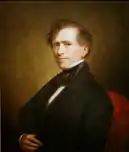
Former Senator
Franklin Pierce
of New Hampshire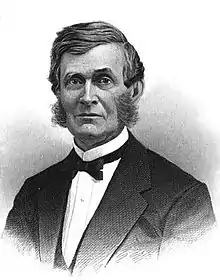
Former Representative
Henry C. Murphy
of New York
Major Presidential candidates
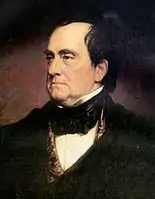

Former Secretary of State
James Buchanan
of Pennsylvania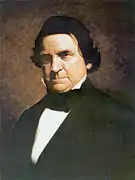
Former Secretary of War
William L. Marcy
of New York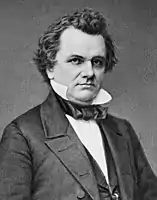
Minor Presidential candidates
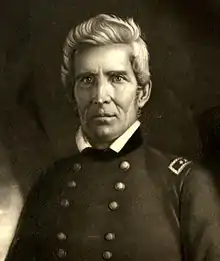
Former Representative
William O. Butler
of Kentucky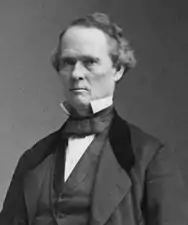
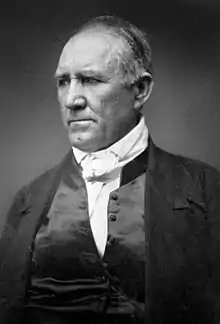
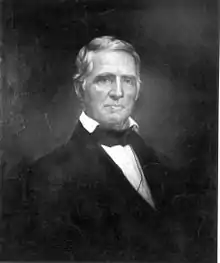
Declined
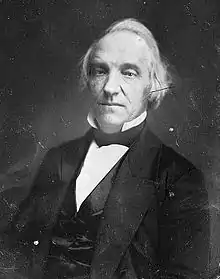
Former Senator
Daniel S. Dickinson
of New York
(Endorsed Cass)
Balloting
As Democrats convened in Baltimore in June 1852, four major candidates vied for the nomination- Lewis Cass of Michigan, the nominee in 1848, who had the backing of northerners in support of the Compromise of 1850; James Buchanan of Pennsylvania, popular in the South as well as in his home state; Stephen A. Douglas of Illinois, candidate of the expansionists and the railroad interests; and William L. Marcy of New York, whose strength was centered in his home state. Throughout the balloting, numerous favorite son candidates received a few votes.
With a two-thirds majority required to win, Cass led on the first 19 ballots, with Buchanan second and Douglas and Marcy exchanging third and fourth places. Buchanan took the lead on the 20th ballot and retained it on each of the next nine tallies. Douglas managed a narrow lead on the 30th and 31st ballots. Cass then recaptured first place through the 44th ballot. Marcy carried the next four ballots.
Franklin Pierce of New Hampshire, a former Congressman and Senator, did not get on the board until the 35th ballot, when the Virginia delegation brought him forward as a compromise choice, selecting Pierce as their dark horse by one vote over former New York Congressman and Brooklyn Mayor Henry C. Murphy, and then supporting him as a unit.[1] After being nominated by the Virginia delegation, Pierce's support remained steady until the 46th ballot, when it began to increase at Cass's expense. Pierce's support was consolidated in subsequent voting, and he was nominated nearly unanimously on the 49th ballot.[2]
According to Edward Stanwood, there was "no doubt that the nomination of General Pierce was carefully planned before the convention met. The originator of the scheme was James W. Bradbury, then a senator from Maine, a college mate and lifelong friend of Pierce."[3]
| Presidential Ballot | |||||||||||||||||||||||||
| Ballot | 1st | 2nd | 3rd | 4th | 5th | 6th | 7th | 8th | 9th | 10th | 11th | 12th | 13th | 14th | 15th | 16th | 17th | 18th | 19th | 20th | 21st | 22nd | 23rd | 24th | 25th |
|---|---|---|---|---|---|---|---|---|---|---|---|---|---|---|---|---|---|---|---|---|---|---|---|---|---|
| Franklin Pierce | 0 | 0 | 0 | 0 | 0 | 0 | 0 | 0 | 0 | 0 | 0 | 0 | 0 | 0 | 0 | 0 | 0 | 0 | 0 | 0 | 0 | 0 | 0 | 0 | 0 |
| Lewis Cass | 116 | 118 | 119 | 115 | 114 | 114 | 113 | 113 | 112 | 111 | 101 | 98 | 98 | 99 | 99 | 99 | 99 | 96 | 89 | 81 | 60 | 43 | 37 | 33 | 34 |
| James Buchanan | 93 | 95 | 94 | 89 | 89 | 88 | 88 | 88 | 87 | 86 | 87 | 88 | 88 | 87 | 87 | 87 | 87 | 85 | 85 | 92 | 102 | 104 | 103 | 103 | 101 |
| William L. Marcy | 27 | 27 | 26 | 25 | 26 | 26 | 26 | 26 | 27 | 27 | 27 | 27 | 26 | 26 | 26 | 26 | 26 | 25 | 26 | 26 | 26 | 26 | 26 | 26 | 26 |
| Stephen A. Douglas | 20 | 23 | 21 | 31 | 34 | 32 | 34 | 34 | 39 | 40 | 50 | 52 | 51 | 51 | 51 | 51 | 50 | 56 | 63 | 64 | 64 | 77 | 78 | 80 | 79 |
| William Orlando Butler | 2 | 1 | 1 | 1 | 1 | 1 | 1 | 1 | 1 | 1 | 1 | 1 | 1 | 1 | 1 | 1 | 1 | 1 | 1 | 1 | 13 | 15 | 20 | 23 | 24 |
| Daniel S. Dickinson | 1 | 1 | 0 | 0 | 1 | 1 | 1 | 1 | 1 | 1 | 1 | 1 | 1 | 1 | 1 | 1 | 1 | 1 | 1 | 1 | 1 | 1 | 1 | 1 | 1 |
| Joseph Lane | 13 | 13 | 13 | 13 | 13 | 13 | 13 | 13 | 13 | 14 | 13 | 13 | 13 | 13 | 13 | 13 | 13 | 13 | 13 | 13 | 13 | 13 | 13 | 13 | 13 |
| Sam Houston | 8 | 6 | 7 | 7 | 8 | 8 | 9 | 9 | 8 | 8 | 8 | 9 | 10 | 10 | 10 | 10 | 9 | 11 | 9 | 10 | 9 | 9 | 10 | 9 | 10 |
| John B. Weller | 4 | 0 | 0 | 0 | 0 | 0 | 0 | 0 | 0 | 0 | 0 | 0 | 0 | 0 | 0 | 0 | 0 | 0 | 0 | 0 | 0 | 0 | 0 | 0 | 0 |
| Henry Dodge | 3 | 3 | 3 | 3 | 3 | 0 | 3 | 3 | 0 | 0 | 0 | 0 | 0 | 0 | 0 | 0 | 0 | 0 | 0 | 0 | 0 | 0 | 0 | 0 | 0 |
| Linn Boyd | 0 | 0 | 0 | 0 | 0 | 0 | 0 | 0 | 0 | 0 | 0 | 0 | 0 | 0 | 0 | 0 | 0 | 0 | 0 | 0 | 0 | 0 | 0 | 0 | 0 |
| William R. King | 0 | 0 | 0 | 0 | 0 | 0 | 0 | 0 | 0 | 0 | 0 | 0 | 0 | 0 | 0 | 0 | 0 | 0 | 0 | 0 | 0 | 0 | 0 | 0 | 0 |
| Jared Ingersoll | 0 | 0 | 0 | 0 | 0 | 0 | 0 | 0 | 0 | 0 | 0 | 0 | 0 | 0 | 0 | 0 | 0 | 0 | 0 | 0 | 0 | 0 | 0 | 0 | 0 |
| Blank | 9 | 9 | 12 | 12 | 7 | 13 | 8 | 8 | 8 | 8 | 8 | 7 | 8 | 8 | 8 | 8 | 10 | 8 | 9 | 8 | 8 | 8 | 8 | 8 | 8 |
| Presidential Ballot | |||||||||||||||||||||||||||||||||
| Ballot | 26th | 27th | 28th | 29th | 30th | 31st | 32nd | 33rd | 34th | 35th | 36th | 37th | 38th | 39th | 40th | 41st | 42nd | 43rd | 44th | 45th | 46th | 47th | 48th | 49th | |||||||||
|---|---|---|---|---|---|---|---|---|---|---|---|---|---|---|---|---|---|---|---|---|---|---|---|---|---|---|---|---|---|---|---|---|---|
| Franklin Pierce | 0 | 0 | 0 | 0 | 0 | 0 | 0 | 0 | 0 | 15 | 30 | 29 | 29 | 29 | 29 | 29 | 29 | 29 | 29 | 29 | 44 | 49 | 55 | 283 | |||||||||
| Lewis Cass | 33 | 32 | 28 | 27 | 33 | 65 | 98 | 123 | 130 | 131 | 122 | 120 | 107 | 106 | 107 | 107 | 101 | 101 | 101 | 96 | 78 | 75 | 72 | 2 | |||||||||
| James Buchanan | 101 | 98 | 96 | 93 | 91 | 83 | 74 | 72 | 49 | 39 | 28 | 28 | 28 | 28 | 27 | 27 | 27 | 27 | 27 | 27 | 28 | 28 | 28 | 0 | |||||||||
| William L. Marcy | 26 | 26 | 26 | 26 | 26 | 26 | 26 | 25 | 33 | 44 | 58 | 70 | 84 | 85 | 85 | 85 | 91 | 91 | 91 | 97 | 98 | 95 | 89 | 0 | |||||||||
| Stephen A. Douglas | 80 | 85 | 88 | 91 | 92 | 92 | 80 | 60 | 53 | 52 | 43 | 34 | 33 | 33 | 33 | 33 | 33 | 33 | 33 | 32 | 32 | 33 | 33 | 2 | |||||||||
| William Orlando Butler | 24 | 24 | 25 | 25 | 20 | 17 | 1 | 1 | 1 | 1 | 1 | 1 | 1 | 1 | 1 | 1 | 1 | 1 | 1 | 1 | 1 | 1 | 1 | 1 | |||||||||
| Daniel S. Dickinson | 1 | 1 | 1 | 1 | 1 | 1 | 1 | 1 | 16 | 1 | 1 | 1 | 1 | 1 | 1 | 1 | 1 | 1 | 1 | 1 | 1 | 1 | 1 | 0 | |||||||||
| Joseph Lane | 13 | 13 | 13 | 13 | 13 | 0 | 0 | 0 | 0 | 0 | 0 | 0 | 0 | 0 | 0 | 0 | 0 | 0 | 0 | 0 | 0 | 0 | 0 | 0 | |||||||||
| Sam Houston | 10 | 9 | 11 | 12 | 12 | 9 | 8 | 6 | 5 | 5 | 5 | 5 | 5 | 5 | 5 | 5 | 5 | 5 | 5 | 5 | 5 | 5 | 6 | 1 | |||||||||
| Linn Boyd | 0 | 0 | 0 | 0 | 0 | 0 | 0 | 0 | 0 | 0 | 0 | 0 | 0 | 0 | 0 | 0 | 0 | 0 | 0 | 0 | 0 | 1 | 2 | 0 | |||||||||
| William R. King | 0 | 0 | 0 | 0 | 0 | 0 | 0 | 0 | 0 | 0 | 0 | 0 | 0 | 0 | 0 | 0 | 0 | 0 | 0 | 0 | 1 | 0 | 0 | 0 | |||||||||
| Jared Ingersoll | 0 | 0 | 0 | 0 | 0 | 0 | 0 | 0 | 0 | 0 | 0 | 0 | 0 | 0 | 0 | 0 | 0 | 0 | 0 | 0 | 0 | 0 | 1 | 0 | |||||||||
| Blank | 8 | 8 | 8 | 8 | 8 | 3 | 8 | 8 | 9 | 8 | 8 | 8 | 8 | 8 | 8 | 8 | 8 | 8 | 8 | 8 | 8 | 8 | 8 | 7 | |||||||||
Source: [4]

1st Ballot
(Peak of Dodge & Weller)
10th Ballot
(Lane's Peak)
22nd Ballot
(Buchanan's Peak)
28th Ballot
(Butler's Peak)
29th Ballot
(Houston's Peak)
30th Ballot
(Douglas' Peak)
34th Ballot
(Dickinson's Peak)
35th Ballot
(Cass' Peak)
46th Ballot
(Peak of King & Marcy)
48th Ballot
(Peak of Boyd & Ingersoll)
49th Ballot
(Pierce Nominated)
Vice Presidential nomination
Vice Presidential candidates

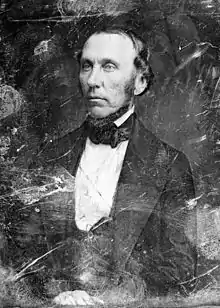

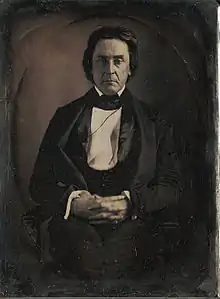
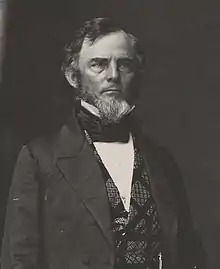
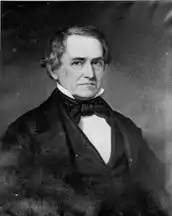
Former Senator
Robert Strange
of North Carolina
Declined

Former Representative
William O. Butler
of Kentucky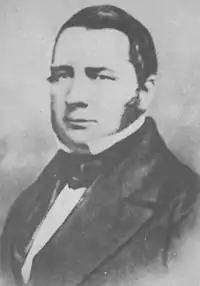
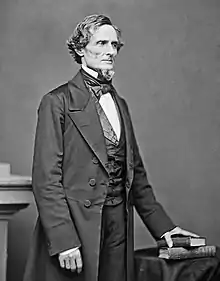
Former Senator
Jefferson Davis
of Mississippi
Former Speaker
Howell Cobb
of Georgia
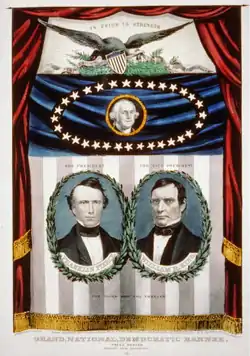
In a peace gesture to the Buchanan wing of the party, Pierce's supporters allowed Buchanan's allies to fill the second position, knowing that they would select Alabama Senator William R. King, to whom Pierce had no objections. King won the nomination on the second ballot. During the ensuing campaign, King's tuberculosis, which he believed he had contracted while living in Paris, denied him the active behind-the-scenes role that he might otherwise have played, although he worked hard to assure his region's voters with the statement that New Hampshire's Pierce was a "northern man with southern principles."
| Vice Presidential Ballot | ||
| Ballot | 1st | 2nd |
|---|---|---|
| William R. King | 125 | 277 |
| Solomon W. Downs | 30 | 0 |
| John B. Weller | 28 | 0 |
| David R. Atchison | 25 | 0 |
| Gideon J. Pillow | 25 | 0 |
| Robert Strange | 23 | 0 |
| William O. Butler | 13 | 0 |
| Thomas J. Rusk | 13 | 0 |
| Jefferson Davis | 2 | 11 |
| Howell Cobb | 2 | 0 |
| Abstaining | 2 | 0 |
Source: US Vice President - D Convention. Our Campaigns. (August 25, 2009).

1st Vice Presidential Ballot 
2nd Vice Presidential Ballot
See also
- History of the Democratic Party (United States)
- 1852 Whig National Convention
- List of Democratic National Conventions
- U.S. presidential nomination convention
- 1852 United States presidential election
References
- Stiles, Henry Reed (1883). Memoir of Hon. Henry C. Murphy, LL.D., of Brooklyn, N.Y. The New York Genealogical and Biographical Record, Volumes 13-14. p. 14.
- William DeGregorio, The Complete Book of U.S. Presidents, Gramercy 1997
- Stanwood, Edward (1898). A History of the Presidency: From 1788 to 1897. Houghton Mifflin Company. p. 248.
- Johnson, Charles W. (1852). Proceedings of the Democratic National Convention Held at Baltimore, June 1-5, 1852. Washington, DC: Robert Armstrong – via HathiTrust.
External links
- Proceedings of the Democratic national convention held at Baltimore, June 1-5, 1852
- Democratic Party Platform of 1852 at The American Presidency Project
| Preceded by 1848 Baltimore, Maryland |
Democratic National Conventions | Succeeded by 1856 Cincinnati, Ohio |